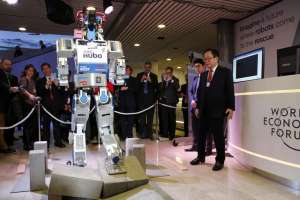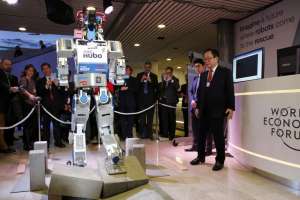
3D printed organs for transplant, internet enabled reading glasses, implantable mobile phones are just a handful of examples of science fiction gadgets which are likely to become science facts tomorrow. The growth of advanced robotics, the giant steps artificial intelligence is taking and the advances in gene editing could radically change the way we perceive reality and live in the near future.
This is what executives surveyed by the World Economic Forum (WEF) believe. Almost half of those surveyed expect an artificial intelligence machine sitting on a corporate’s board of directors within the next ten years.
It appears that the next stage of industrial revolution, the “fourth industrial revolution”, is in the offing, which is likely to pose big challenges to workers, society as a whole, companies and governments alike.
The promise of cheaper and yet better more intelligent goods is driving this new wave of economic growth. On the other hand, this new found benefits threaten to breakdown the already strained relationship between corporations and the ordinary citizens. Adding to this pressure point is the threat of mass unemployment that these more efficient technologies and processes bring.
"There is an economic surplus that is going to be created as a result of this fourth industrial revolution," said Satya Nadella, Microsoft’s CEO at WEF's annual meeting in Davos.
He went on to add, "The question is how evenly will it be spread between countries, between people in different economic strata and also different parts of the economy."
Already robots have made their way into our homes from their traditional stay in factories. We are increasingly leaning on them in war zones, hospitals, restaurants and in shops. Advances in artificial intelligence are slowly blurring the lines between machine and man.
Case in point, one of the most in-demand participants in Davos, this year, is not a CEO, politician or a banker, it is in fact a prize winning robot from South Korea called HUBO. While the smartphone clicking delegates are in awe of this technological wonder, it is also a worrisome matter.
The news report prepared by UBS which it released in Davos is a wake-up call to the problems of increased connectivity and automation which ultimately will only deepen inequalities by widening the gap between the developed and the developing economies.
“The fourth industrial revolution has potentially inverted the competitive advantage that emerging markets have had in the form of low-cost labor. It is likely, I would think, that it will exacerbate inequality if policy measures are not taken,” said Lutfey Siddiqi, global head of emerging markets for FX, rates and credit at UBS.
As per an analysis of its report, the Swiss banking giant has concluded that Switzerland would be the best country to adapt to this highly automated world while Argentina has been ranked at the other end of the spectrum.
Although pessimist fear that middle-class and middle-incomed jobs are set to be lost at an unprecedented scale, the WEF itself has forecast that 5 million jobs will be lost in 15 major economies by 2020, however, Jonas Prising, ManpowerGroup’s CEO, said "If history is any indicator, we'll have more jobs being created in the end than are going to be destroyed,".
This is what executives surveyed by the World Economic Forum (WEF) believe. Almost half of those surveyed expect an artificial intelligence machine sitting on a corporate’s board of directors within the next ten years.
It appears that the next stage of industrial revolution, the “fourth industrial revolution”, is in the offing, which is likely to pose big challenges to workers, society as a whole, companies and governments alike.
The promise of cheaper and yet better more intelligent goods is driving this new wave of economic growth. On the other hand, this new found benefits threaten to breakdown the already strained relationship between corporations and the ordinary citizens. Adding to this pressure point is the threat of mass unemployment that these more efficient technologies and processes bring.
"There is an economic surplus that is going to be created as a result of this fourth industrial revolution," said Satya Nadella, Microsoft’s CEO at WEF's annual meeting in Davos.
He went on to add, "The question is how evenly will it be spread between countries, between people in different economic strata and also different parts of the economy."
Already robots have made their way into our homes from their traditional stay in factories. We are increasingly leaning on them in war zones, hospitals, restaurants and in shops. Advances in artificial intelligence are slowly blurring the lines between machine and man.
Case in point, one of the most in-demand participants in Davos, this year, is not a CEO, politician or a banker, it is in fact a prize winning robot from South Korea called HUBO. While the smartphone clicking delegates are in awe of this technological wonder, it is also a worrisome matter.
The news report prepared by UBS which it released in Davos is a wake-up call to the problems of increased connectivity and automation which ultimately will only deepen inequalities by widening the gap between the developed and the developing economies.
“The fourth industrial revolution has potentially inverted the competitive advantage that emerging markets have had in the form of low-cost labor. It is likely, I would think, that it will exacerbate inequality if policy measures are not taken,” said Lutfey Siddiqi, global head of emerging markets for FX, rates and credit at UBS.
As per an analysis of its report, the Swiss banking giant has concluded that Switzerland would be the best country to adapt to this highly automated world while Argentina has been ranked at the other end of the spectrum.
Although pessimist fear that middle-class and middle-incomed jobs are set to be lost at an unprecedented scale, the WEF itself has forecast that 5 million jobs will be lost in 15 major economies by 2020, however, Jonas Prising, ManpowerGroup’s CEO, said "If history is any indicator, we'll have more jobs being created in the end than are going to be destroyed,".





